- Home
- Isaac Hooke
ATLAS 3 (ATLAS Series Book 3) Page 2
ATLAS 3 (ATLAS Series Book 3) Read online
Page 2
Shaw waited, unsure of what to do. She wondered if she had moved away from the mech too soon. Perhaps Azen hadn’t finished the transfer process and a part of him remained inside her jumpsuit.
She was about to approach when the alien mech abruptly knelt, startling her. Its vision sensor activated and that wide, red cyclopean eye stared at her. For a moment she thought the mech was going to attack her, since to her its stance screamed aggression.
But then a seam formed in the torso and a hatch flipped down, revealing an inner cockpit not entirely unlike that of an ATLAS unit—which made some sense, given that the alien mechs were partially modeled after captured ATLAS 5s.
Shaw pulled herself onto the thigh, then into the cockpit. When the hatch folded closed, darkness enveloped her. Her headlamp was useless here. Navigating a menu on her aReal with her eyes, she shut off the light to save power.
Inner actuators pressed into her jumpsuit, enclosing her body like a cocoon; her legs were forced into a flexed position as the mech’s kneeling posture was translated to her own.
Still seeing nothing, she stood up. The actuators yielded beneath her, but as she couldn’t actually see yet, she wasn’t sure whether she was in control of the mech or not. Had the unit really stood up?
An external vid feed abruptly filled her vision. She looked down on the ship’s cylindrical core from the height of the mech, which had indeed risen to its full twenty-five-meter stature. There were no external lights on the unit—discounting the glow from the visual sensor of course, which wasn’t enough to illume the surroundings. Instead, Azen had activated some sort of night vision, giving everything a dark green tinge.
She took a step forward. Control of the mech was indeed hers. The mech’s interface would feel awkward to Azen, who would need time to practice, but for Shaw, controlling the mech felt only vaguely different from piloting the ATLAS 5 she had discovered on the planet Geronimo. These things were specifically designed for human pilots after all. Human host pilots, that is, with Phants grafted to them.
She felt slightly clumsy operating the overlarge machine at first, but quickly acclimated. She focused on taking one large step after another, making her way back across the gangway toward the main entrance.
She disliked the surreal green coloration the night vision enforced on everything. It was hard to pick out details. Spec-ops soldiers might enjoy such “stealth” perception, but not Shaw. When copies of the machine were made, she’d have to get Azen to install a light source of some kind in the hull.
Up there in that mech she felt powerful, yet exposed at the same time. She wondered what the sentry up ahead would do now that the Phant inside her jumpsuit had flowed into the AI of the mech instead. Azen had assured her the sentries would let them pass regardless. Shaw wasn’t so convinced.
Sure enough, as she neared the entrance, the mech on duty moved to intercept her, blocking access to the ramp that led to the lower deck. In her night vision, it appeared as a green figure with a soft white glow around its visual sensor.
Shaw didn’t say a word. She knew Azen would be communicating with the Phant inside it at that very moment, using her mech’s AI to exchange data with the other unit’s. Phants could also communicate directly via telepathy; Shaw didn’t know how it worked, other than that it took a minimum of twenty Stanminutes to exchange a message. Far too much time right then.
Glancing at the countdown on her HUD, Shaw waited, resisting the urge to fidget. Any movements, no matter how subtle, would be mirrored externally by her mech. Azen probably already had enough trouble explaining why his passenger was no longer a host. If he had to explain fidgeting, too, that could be the end of them.
The alien sentry finally stepped aside, apparently satisfied with whatever explanations Azen had supplied.
Shaw proceeded into the tighter lower deck. She advanced at a confident lope, using the HUD map for guidance. She was forced to crouch slightly because the overdeck scraped the top of her oblong head if she stood too tall. It felt odd, traveling these corridors that had previously felt like vast metal halls but now seemed like cramped green cages.
The passageway widened as she reached the main corridor leading to the airlock; two alien mechs could walk abreast there, just barely, if they desired. The overdeck wasn’t any higher, however, and she still had to maintain a slight crouch.
She glanced at the timer on her HUD. Five minutes left.
She neared the airlock.
The original sentry stood in front of the sealed hatch in the floor, facing Shaw, blocking her way.
Here we go again, she thought.
She waited, knowing that Azen was probably already exchanging messages with the alien mech.
One minute passed.
Two.
Still the mech did not move. The corridor was just wide enough for her to squeeze around the sentry if she wished, but she wasn’t going to risk that.
Let Azen do his job.
She flicked her eyes nervously toward the timer on her HUD, watching it steadily count down.
She wanted to say something to Azen, wanted to warn him that time was running out, but of course he knew. Saying anything would only serve to distract him. Besides, he had ordered Shaw not to speak while she was aboard the Foundry. She wasn’t sure why, given that there was no atmosphere out there to transmit sound, but Azen seemed convinced that any words coming from her mouth would betray them.
At the three-minute mark, the alien mech moved aside.
Finally.
She glanced at the timer. Two minutes remaining.
Shaw stepped past the mech, feeling anxious. Part of her wondered if the enemy mech was scanning her vital signs. Her heartbeat. Her respiration. If so, then it would know how nervous she was. She forced herself to calm down.
Clear your mind, Shaw.
The airlock spiraled open below; her night vision represented the cargo hold as a solid green mass due to the relatively bright lights shining from within.
Before she could drop through the hatch and into the shuttle’s hold, the giant sentry plowed into Shaw from the right flank, pinning her mech to the bulkhead.
The inner actuators of the cockpit tightened around her, squeezing her to the side in a stance that mirrored the posture of her mech. She pressed against those actuators but the cocoon wouldn’t budge.
This wasn’t part of the plan. Not at all.
She spoke at last. One word. “Azen . . .”
“Fight, Shaw Chopra,” Azen said via the cockpit speakers, using the synthesized voice of the internal AI.
Shaw placed both of her hands against the bulkhead, but no matter how hard she pushed, her mech remained absolutely pinned. Her opponent had probably braced its body against the opposite bulkhead, which allowed it to exert the greatest possible pressure upon her. She wouldn’t be breaking out of that grip any time soon.
A proximity alert sounded on her HUD and she knew that the second sentry was fast approaching from behind. She glanced at the timer on the HUD.
One minute.
She couldn’t see the mech that pinned her, couldn’t turn her head far enough to look at it, but she reached around with one metallic hand, groping . . . the feedback sensors told her that her fingers had clasped one of its smooth limbs. Moving her fingers along that limb, she felt what she thought was her opponent’s wrist. She clamped her fingers around it and tried to wrench the limb sideways.
It didn’t budge.
Fifty seconds.
“Azen, what would happen if you flowed into the sentry’s brain case?” Shaw said.
“Nothing,” Azen answered. “I wouldn’t be able to wrest control away from the existing entity.”
“But I bet you’d distract it,” Shaw said.
Azen didn’t answer immediately; apparently he was carefully considering her request. And then: “Be ready.”
/> Shaw repositioned both hands against the bulkhead in front of her and began pushing steadily. Slowly she increased the pressure she exerted, mindful all the while of the proximity alarm and the HUD countdown.
Forty seconds.
Abruptly the sentry’s hold weakened.
She shoved backward with all her strength, smashing her captor into the far wall. She broke free of the mech’s grasp and twisted around to hurl her opponent to the deck.
Her night vision revealed the second mech sprinting down the corridor. It had almost reached her.
The gaseous form of Azen misted from the mech beneath her and quickly vented back into the torso of Shaw’s mech.
Thirty seconds.
“Azen, you in?” she said.
“Go!” Azen returned via the AI.
Shaw leaped into the bright green hole in the deck. She dropped through the airlock and into the solid green mass of the cargo hold, whose lights overwhelmed her night vision.
She spread her legs, hoping her feet would land on either side of the gap in the partition that led to the cockpit—it wouldn’t do to smash one of those heavy feet through the cockpit window.
She touched down soundlessly on the partition. She knew because her knees bent, slamming into the enclosing bulkhead. Her twenty-five-meter-tall body barely fit the confines of the shuttle’s hold.
Above her the airlock spiraled closed. Azen had used the mech’s AI to interface with the shuttle already, no doubt.
“Open up!” she said.
The vid feed to her helmet cut out as the cockpit actuators pulled away. The mech’s hatch fell open at a forty-five-degree angle, slamming into the encasing bulkhead. The illumination from the cargo bay flooded inside. It felt odd viewing the world with her own eyes, under normal lighting conditions again.
She pulled herself through the partially open hatch, wrapped her arms around the mech’s smooth waist, and slid down. The sleek surface didn’t afford much of a grip so she dropped a little too fast. Her boots slammed into the metal partition and she nearly lost her balance.
She hurriedly climbed into the downward-facing cockpit of the shuttle, using the backrests on the seats for support. Azen was already there: she caught a glimpse of green mist vanishing inside a nearby console.
The craft shuddered and broke free from the Foundry vessel.
Before she could seat herself, the rear thrusters fired at full power.
Shaw was wrenched backward, clinging to the seat for all she was worth. But even with the enhanced strength of the exoskeleton, her grip failed. She collided with the cockpit partition behind her and the G forces glued her there. She couldn’t get the “amusement park ride” analogy out of her head.
Azen switched the view on the main window to the rearmost camera so she could watch the cylindrical ship recede. That was somewhat courteous of him. Somewhat.
Before the Foundry ship could launch offensive measures or make any attempt to pursue, it exploded. Debris caused by her handiwork scattered in all directions, though it was only a fraction of what could be expected for a vessel of that size: more than three-fourths of the craft had vaporized instantly. The expanding remains reminded her of a space firecracker with the middle cut out.
There was no shockwave—the only threat was from the expanding debris, which Azen quickly accelerated away from.
After some moments, Azen issued stabilizing thrust. Weightlessness returned, giving Shaw a moment to pull herself into the leftmost seat. When the clamps took hold of her waist, Azen accelerated in a new direction.
Shaw closed her eyes, trying to settle in for the long wait. It would be several days before the two of them reached the mothership, which lurked out of sight on the far side of the dead star.
She found it difficult to calm down. Opening her eyes, she glanced at her shaking gloves. Her breath still came in rapid heaves. Her heart yet pounded. She felt completely drained.
She wasn’t entirely cut out for this kind of work. She wasn’t a spec-ops soldier. Not like Rade, a man she wondered if she’d ever see again. Though to be honest, she’d been through worse, fighting for her life against odds that would make even the most dedicated spec-ops soldier blanch. Even so, that feeling of being run through a washer and hung out to dry got nastier every time.
Might as well get used to it, she told herself.
Because she wasn’t done fighting.
Not by a long shot.
CHAPTER ONE
Rade
I’m not the same person I was when I joined the Navy.
I still remember the day I walked into the Military Entrance Processing Station in New San Antonio, so full of hope, so damn naive. I swaggered past the full-body scanners and on a whim chose the Navy because of a cute girl in line.
During the welcome speech given to the recruits, I perused the guidebook installed in my embedded ID and learned about the MOTHs. MObile Tactical Humans—the special forces of the Navy. Its members endured the hardest training known to man, and the privileged few who graduated were given the most important spec-ops missions in the galaxy.
That was for me.
The crucible of Basic Training prepared me for what was to come. The hammer that was the First Phase of MOTH school forged me, and I succeeded where ninety-eight percent of men failed. The waters of Second Phase quenched me, and prepared me for all missions at sea. The moon drops of Third Phase tempered me, and taught me how to survive in space. The small-unit tactics of Fourth Phase completed the process, and sharpened me into the spec-ops commando I am today. When I graduated, I was a finely honed combat knife, ready to be wielded wherever I was needed.
And then the deployments began.
Every time I fought for my life, nicks and grooves appeared in the blade I had become. When I watched my friends die, a stress fracture appeared down the middle. When I killed a woman who reminded me of one of them, the fracture deepened. Finally, when I was captured and tortured, the blade broke in two.
I’m only now putting the pieces of that blade back together.
I used to be so innocent. Shielded from the dark side of humanity. But now I’ve had that blissful wool lifted from my eyes and every day I stare into the murk and I ask myself: Is it worth it?
I try to remind myself that wherever there is darkness there must be light. That always something good, something beautiful, resides out there, even in the shadows.
I try to remind myself of that, but often fail.
Darkness.
I used to wonder if I had it in me to take another man’s life. But because of my training, killing became an automatic thing. I didn’t even need to think about it. Out in Mongolia during my first deployment, I cut down tangos—targets—left and right. Tangos. We called them that because it gave us a way of dehumanizing those we shot. I felt a bit of guilt after each kill, but not much. These were bad men who hated us and what we stood for, militants who wouldn’t hesitate to pull the same trigger against us if given the chance.
I’ve since graduated to mowing down aliens. When I fight the invaders, it’s like I’m squashing bugs under my boots, nothing more. I’m sure they feel the same way about us. As you might expect, I experience even less guilt when I kill them versus another human being.
Darkness.
War has inured me and my brothers to death. We cheer when we see an alien’s body ripped apart in an explosion of black blood and guts, or laugh when an alien flails about, covered in flames, frantically moving from place to place as it burns to death from the jellied gasoline of our incendiary rounds. We cheer, because if we didn’t, we’d go insane.
I’m definitely not the same person I was when I joined the Navy.
To be honest, I don’t even know who the hell I am anymore. I’m probably fighting for all the wrong reasons. I’d like to say I went to war out of duty, or to save humanity, but that isn’
t the case, at least not anymore. Because for me, it’s mostly about vengeance. Alejandro. Shaw. Big Dog. Lana. They all died because of the enemy.
And I would see that enemy pay.
Sure, I’m all for helping humanity, just as long as a whole lot of enemy corpses pave the road along the way.
At least that’s what I tell myself.
I have to.
It’s my way of picking up the broken pieces of the knife.
I sat in the briefing room of the Gerald R. Ford along with the rest of Alfa platoon. Until that day, the powers that be had yet to devise any sort of viable strategy or defense against the enemy, given the seemingly insurmountable nature of our foe.
But I knew that would change with this briefing. You didn’t assemble MOTHs unless you had something important for them to do.
Beyond the briefing room’s starboard-side window swirled the blue and white clouds of the gas giant Tau Ceti II, a planet located deep within SK (Sino-Korean) space. Tau Ceti II orbited the system’s habitable zone, making its three moons the perfect sites for terraforming. Indeed, these moons had once been thriving colonies. Covered in sprawling meadows and forests, they had housed one million inhabitants each.
That changed when the Skull Ship arrived. My platoon first encountered this evil craft at the tail end of a Slipstream eight thousand lightyears from here. We’d gone on a covert exploratory op, which ended badly. We fled, destroying the Gate behind us, and in our hubris believed that would be enough to keep the aliens away.
We were wrong.
The first Skull Ship came some eight months after our initial encounter. It repelled all attempts at attack and attached itself to one of the three aforementioned moons, Tau Ceti II-c, and began its own terraforming. My platoon joined an advance force sent in to help the SKs repel the threat.
We failed.
Last week, another Skull Ship appeared seemingly from nowhere in orbit above a second moon, Tau Ceti II-b. Like the first, it arrived without much fanfare, promptly launching an attack against the colony’s sole city, Hongleong. The colony fell immediately, and within twenty-four hours the enormous vessel had lodged its lower tip inside the moon’s crust and had begun transforming the surface.

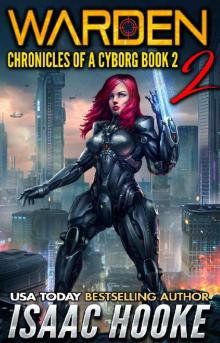 Warden 2
Warden 2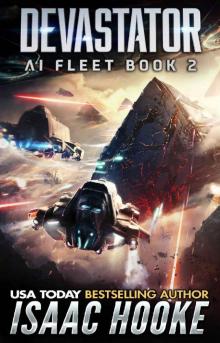 Devastator
Devastator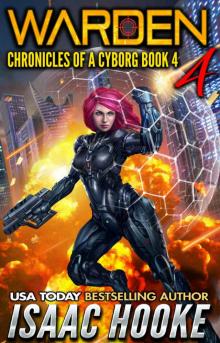 Warden 4
Warden 4 Emperor
Emperor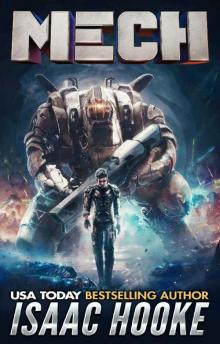 Mech
Mech Conqueror
Conqueror Fighter
Fighter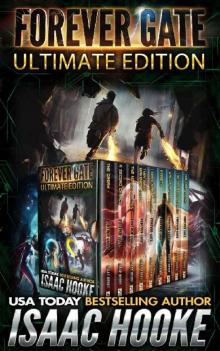 The Forever Gate Ultimate Edition
The Forever Gate Ultimate Edition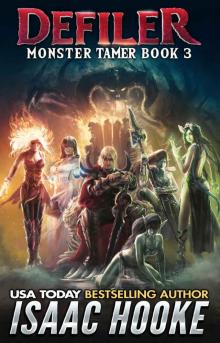 Defiler
Defiler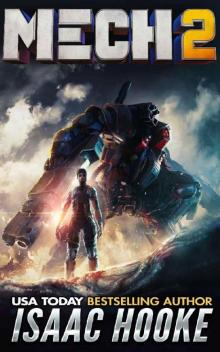 Mech 2
Mech 2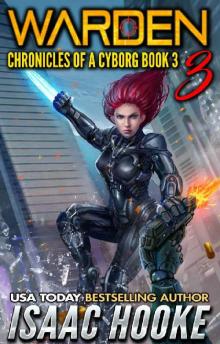 Warden 3
Warden 3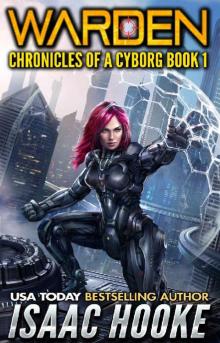 Warden 1
Warden 1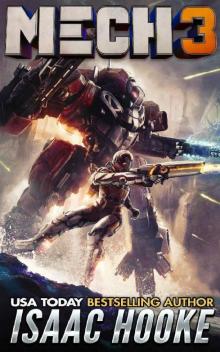 Mech 3
Mech 3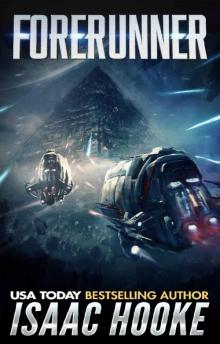 Forerunner
Forerunner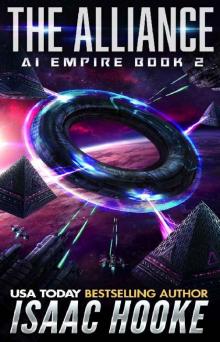 The Alliance (AI Empire Book 2)
The Alliance (AI Empire Book 2)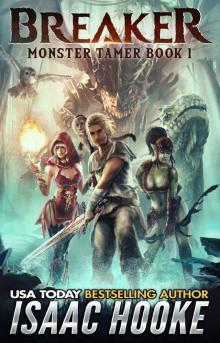 Breaker (Monster Tamer Book 1)
Breaker (Monster Tamer Book 1) Bender of Worlds
Bender of Worlds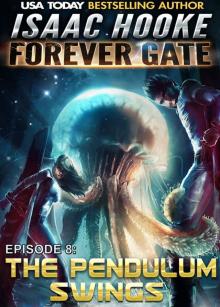 The Pendulum Swings (The Forever Gate Book 8)
The Pendulum Swings (The Forever Gate Book 8)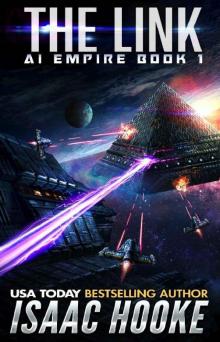 The Link
The Link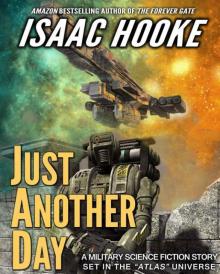 Just Another Day
Just Another Day Star Warrior
Star Warrior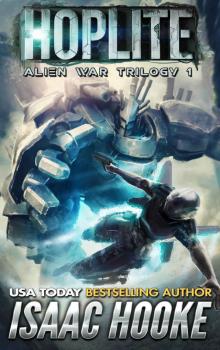 Alien War Trilogy 1: Hoplite
Alien War Trilogy 1: Hoplite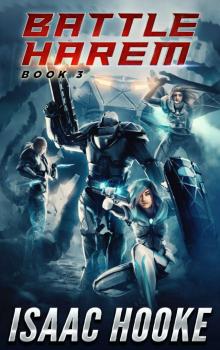 Battle Harem 3
Battle Harem 3 The Ethan Galaal Series: Books 1 - 3
The Ethan Galaal Series: Books 1 - 3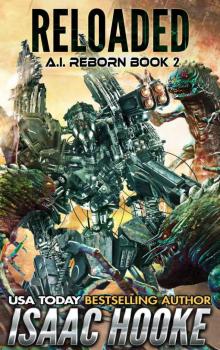 Reloaded
Reloaded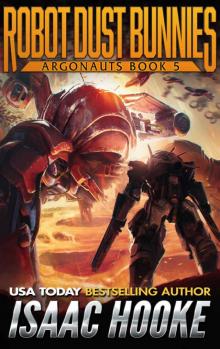 Robot Dust Bunnies (Argonauts Book 5)
Robot Dust Bunnies (Argonauts Book 5) Battle Harem
Battle Harem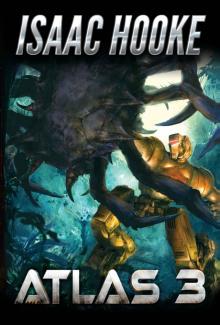 ATLAS 3 (ATLAS Series Book 3)
ATLAS 3 (ATLAS Series Book 3)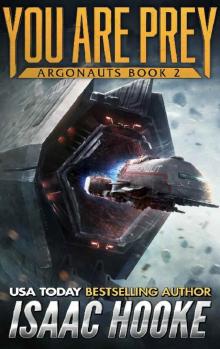 Argonauts 2: You Are Prey
Argonauts 2: You Are Prey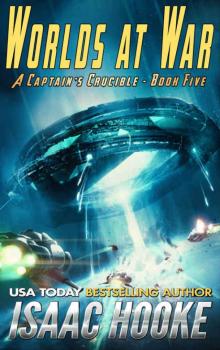 Worlds at War (A Captain's Crucible Book 5)
Worlds at War (A Captain's Crucible Book 5)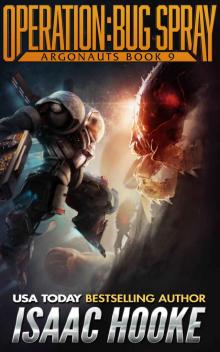 Operation: Bug Spray (Argonauts Book 9)
Operation: Bug Spray (Argonauts Book 9)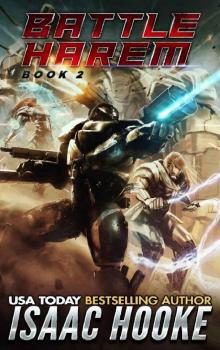 Battle Harem 2
Battle Harem 2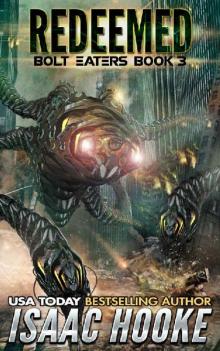 Redeemed (Bolt Eaters Trilogy Book 3)
Redeemed (Bolt Eaters Trilogy Book 3)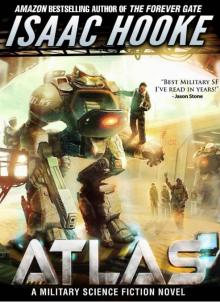 Atlas
Atlas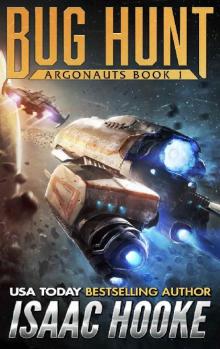 Argonauts 1: Bug Hunt
Argonauts 1: Bug Hunt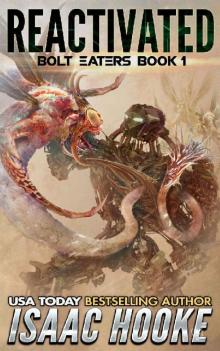 Reactivated (Bolt Eaters Trilogy Book 1)
Reactivated (Bolt Eaters Trilogy Book 1)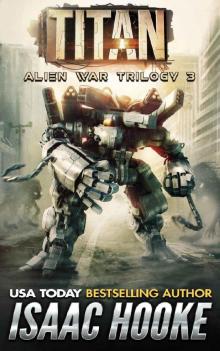 Alien War Trilogy 3: Titan
Alien War Trilogy 3: Titan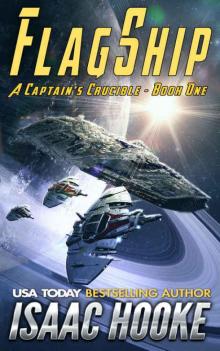 Flagship (A Captain's Crucible #1)
Flagship (A Captain's Crucible #1)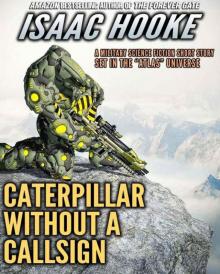 Caterpillar Without A Callsign
Caterpillar Without A Callsign The Forever Gate
The Forever Gate He Who Crosses Death (Star Warrior Quadrilogy Book 3)
He Who Crosses Death (Star Warrior Quadrilogy Book 3)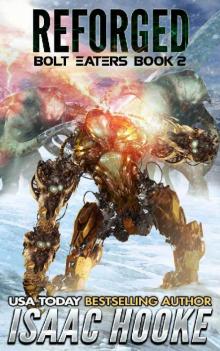 Reforged (Bolt Eaters Trilogy Book 2)
Reforged (Bolt Eaters Trilogy Book 2)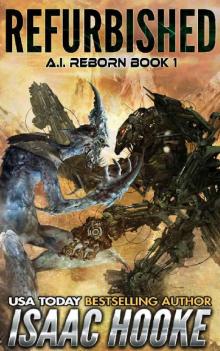 Refurbished
Refurbished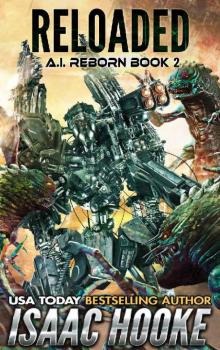 Reloaded (AI Reborn Trilogy Book 2)
Reloaded (AI Reborn Trilogy Book 2) He Who Crosses Death
He Who Crosses Death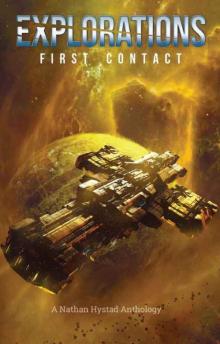 Explorations: First Contact
Explorations: First Contact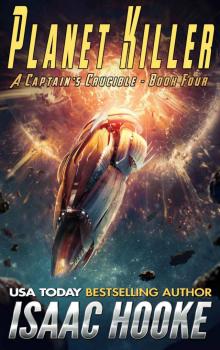 Planet Killer (A Captain's Crucible Book 4)
Planet Killer (A Captain's Crucible Book 4)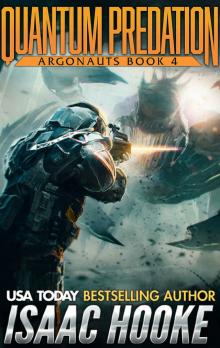 Quantum Predation (Argonauts Book 4)
Quantum Predation (Argonauts Book 4) Clandestine-IsaacHooke-FreeFollowup
Clandestine-IsaacHooke-FreeFollowup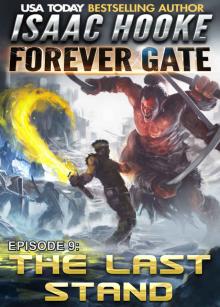 The Last Stand (The Forever Gate Book 9)
The Last Stand (The Forever Gate Book 9)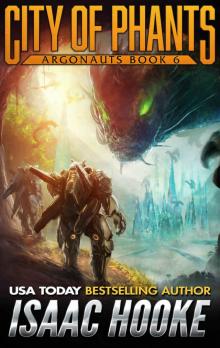 City of Phants (Argonauts Book 6)
City of Phants (Argonauts Book 6)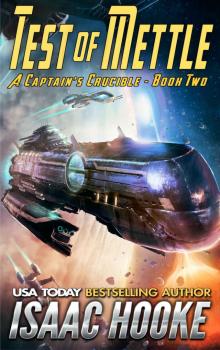 Test of Mettle (A Captain's Crucible Book 2)
Test of Mettle (A Captain's Crucible Book 2)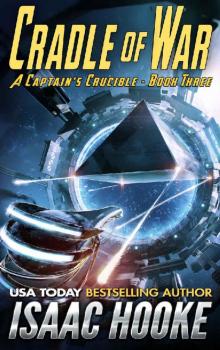 Cradle of War (A Captain's Crucible Book 3)
Cradle of War (A Captain's Crucible Book 3)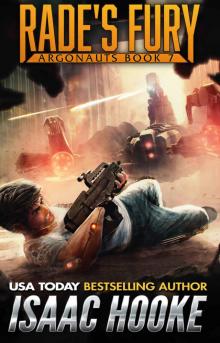 Rade's Fury (Argonauts Book 7)
Rade's Fury (Argonauts Book 7) Rebirth (The Forever Gate Book 6)
Rebirth (The Forever Gate Book 6) The Forever Gate Compendium Edition
The Forever Gate Compendium Edition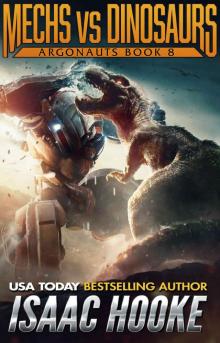 Mechs vs. Dinosaurs (Argonauts Book 8)
Mechs vs. Dinosaurs (Argonauts Book 8)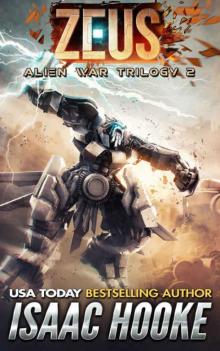 Alien War Trilogy 2: Zeus
Alien War Trilogy 2: Zeus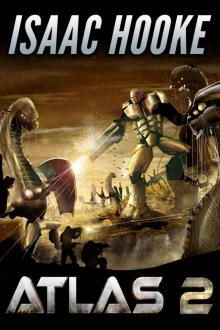 ATLAS 2 (ATLAS Series Book 2)
ATLAS 2 (ATLAS Series Book 2)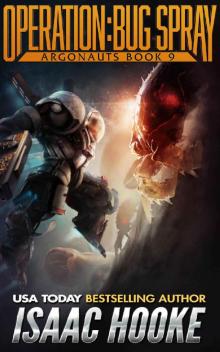 Operation_Bug Spray
Operation_Bug Spray